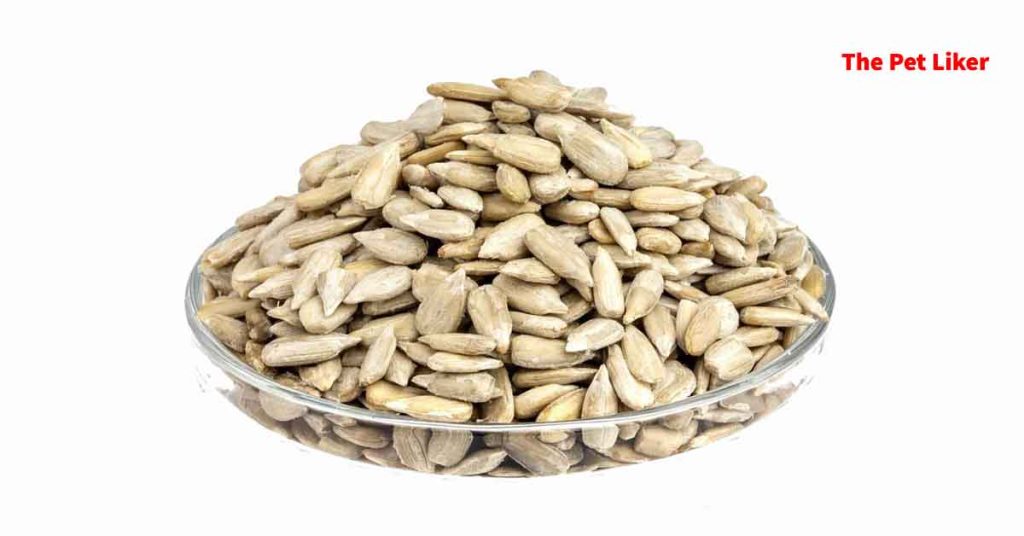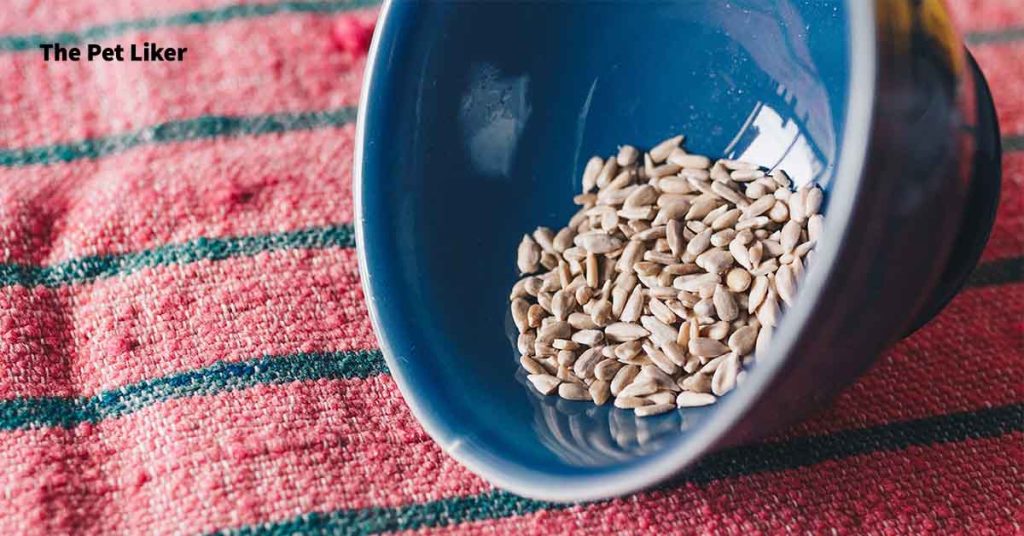Cats are curious creatures, and they love to explore their surroundings. As a cat owner, you may be wondering if Can Cats Eat sunflower seeds?
Sunflower seeds are a popular snack for humans, but are they safe for cats to eat?
In this article, we’ll explore whether or not cats can eat sunflower seeds and what potential benefits or risks may be involved.
It’s important to know what foods are safe for your cat to consume, so let’s dive in and find out!
The Nutritional Value of Sunflower Seeds
Sunflower seeds are a rich source of nutrients, including:
- Protein: Sunflower seeds are a good source of plant-based protein, with about 5.5 grams of protein per ounce.
- Healthy fats: Sunflower seeds are rich in healthy fats, such as polyunsaturated and monounsaturated fats, which can help support a cat’s skin and coat health.
- Fiber: Sunflower seeds are a good source of dietary fiber, which can help support digestive health and prevent constipation.
- Vitamins and minerals: Sunflower seeds contain several vitamins and minerals, including vitamin E, magnesium, selenium, and zinc, which can help support overall health.
- Antioxidants: Sunflower seeds are a rich source of antioxidants, such as vitamin E and phenolic compounds, which can help protect the body’s cells from damage.
Can Cats Eat Sunflower Seeds?
Sunflower seeds are not toxic to cats, and in small amounts, they are generally safe for cats to eat. It’s important to keep in mind that sunflower seeds are not a natural part of a cat’s diet and should not be a significant part of their daily nutrition.
While sunflower seeds contain some beneficial nutrients like protein, healthy fats, and fiber, they are also high in calories and can lead to weight gain if given in excess. The shells of sunflower seeds can be difficult for cats to digest and may cause digestive issues such as vomiting or diarrhea.
If you do choose to feed your cat sunflower seeds, it’s important to do so in moderation and to only offer them as an occasional treat. Be sure to remove the shells and offer only the seeds themselves, and avoid salted or flavored varieties, which can contain additives that are harmful to cats.
It’s always best to stick to a balanced and complete diet designed specifically for cats to ensure they are getting all of the necessary nutrients they need to stay healthy and happy.

Are Sunflower Seeds Safe For Cats?
In small amounts, sunflower seeds are generally considered safe for cats to eat. They should not be a significant part of their daily diet, and it’s important to keep in mind that they are not a natural part of a cat’s diet.
Does Cats Like Sunflower Seeds?
Cats may or may not like the taste of sunflower seeds. Like all animals, cats have their own individual preferences and tastes when it comes to food. Some cats may find the texture and flavor of sunflower seeds appealing, while others may not show much interest in them at all.
Even if your cat does seem to enjoy sunflower seeds, it’s important to remember that they should only be given to cats in moderation, as they are not a natural part of a cat’s diet and can be high in calories.
The shells of sunflower seeds can be difficult for cats to digest and may cause digestive issues if consumed in large quantities.

Benefits ✅
Sunflower seeds contain several beneficial nutrients that can provide some health benefits for cats when given in moderation. These include:
- Protein: Sunflower seeds are a good source of plant-based protein, which is essential for building and repairing tissues in a cat’s body.
- Healthy fats: Sunflower seeds contain healthy fats, such as omega-6 fatty acids, which can help support a cat’s skin and coat health.
- Fiber: Sunflower seeds are a good source of dietary fiber, which can help support digestive health and prevent constipation.
- Vitamins and minerals: Sunflower seeds contain several vitamins and minerals, including vitamin E, magnesium, and selenium, which can help support overall health.
Risks ❌
While sunflower seeds are generally considered safe for cats to eat in moderation, there are some potential risks and concerns to keep in mind:
- Digestive issues: The shells of sunflower seeds can be difficult for cats to digest and may cause digestive problems such as vomiting, diarrhea, or constipation if consumed in large quantities.
- High in calories: Sunflower seeds are high in calories and can lead to weight gain and obesity if given in excess. It’s important to offer sunflower seeds only as an occasional treat and to monitor your cat’s overall calorie intake.
- Additives and flavorings: Some varieties of sunflower seeds may contain additives or flavorings that are harmful to cats. Be sure to read the ingredient labels carefully and avoid any products that contain ingredients that are toxic to cats, such as onions or garlic.
- Allergic reactions: Some cats may be allergic to sunflower seeds or other types of seeds. Signs of an allergic reaction may include itching, swelling, or difficulty breathing. If you notice any of these symptoms after giving your cat sunflower seeds, stop giving them immediately and contact your veterinarian.
Servings 🍽️
Here are some tips on how to serve sunflower seeds to cats:
- Remove the shells: The shells of sunflower seeds can be difficult for cats to digest and may cause digestive problems if consumed in large quantities. It’s important to remove the shells before offering sunflower seeds to your cat.
- Offer plain, unsalted seeds: Salted or flavored sunflower seeds are not safe for cats and may contain harmful ingredients such as garlic or onion. It’s important to offer only plain, unsalted sunflower seeds to your cat.
- Give in moderation: Sunflower seeds are high in calories and should only be given to cats as an occasional treat. It’s important to monitor your cat’s overall calorie intake and adjust their diet accordingly if you choose to give them sunflower seeds.
- Mix with other foods: You can mix sunflower seeds with your cat’s regular food as a tasty and nutritious addition. This can also help prevent your cat from overeating sunflower seeds.
- Watch for allergic reactions: Some cats may be allergic to sunflower seeds or other types of seeds. If you notice any signs of an allergic reaction, such as itching, swelling, or difficulty breathing, stop giving sunflower seeds to your cat immediately and contact your veterinarian.
Wrapping Up
Hope this article answered your question “can cats eat sunflower seeds?”
While sunflower seeds can provide some nutritional benefits for cats when given in moderation, they should not be a significant part of their diet.
It’s important to keep in mind the potential risks and concerns associated with feeding sunflower seeds to cats, such as digestive issues, high-calorie intake, and potential allergic reactions.
If you do choose to give your cat sunflower seeds as a treat, be sure to remove the shells, offer only plain varieties, and monitor their intake to avoid any health issues.
As always, it’s best to consult with your veterinarian about your cat’s diet and nutritional needs to ensure they are getting all the nutrients they need to stay healthy and happy.
Thank you for reading! Always stay with The pet liker!! Have a nice day!!!
FAQ:
Here are some frequently asked questions about cats and sunflower seeds:
Q: Can sunflower seeds be harmful to cats?
A: Sunflower seeds are generally considered safe for cats in moderation. However, the shells can be difficult for cats to digest, and too many seeds can lead to digestive issues, weight gain, and other health problems.
Q: What are the benefits of feeding sunflower seeds to cats?
A: Sunflower seeds contain protein, healthy fats, fiber, vitamins, and minerals that can support a cat’s overall health. However, they should not be a significant part of a cat’s diet, and should only be given as an occasional treat.
Q: Can cats be allergic to sunflower seeds?
A: Yes, some cats may be allergic to sunflower seeds or other types of seeds. Signs of an allergic reaction may include itching, swelling, or difficulty breathing.
Q: Should I give my cat salted or flavored sunflower seeds?
A: No, salted or flavored sunflower seeds are not safe for cats. They can contain additives or flavorings that are harmful to cats, such as onions or garlic.
Q: What other treats can I give my cat instead of sunflower seeds?
A: There are many safe and healthy treats available specifically designed for cats, such as freeze-dried meat treats or catnip-flavored treats. It’s always best to consult with your veterinarian about the best treats for your individual cat based on their age, health status, and nutritional needs.

